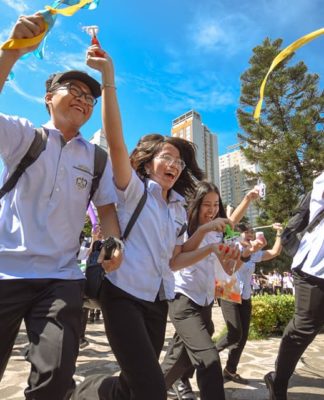 “ONLINE journalism is journalism practiced online.”
“ONLINE journalism is journalism practiced online.”
Such were the words of Manila Bulletin technology editor Art Samaniego during the 15th edition of Inkblots, the UST National Campus Journalism Fellowship annually subsidized by the Varsitarian.
Samaniego emphasized before some 300 aspiring journalists that the so-called “new media” is still governed by the same journalistic standards and basic ethical principles being observed by the traditional press. The only difference is the platform.
But for “social news network” Rappler, which claims to inspire a “thirst for social change” through its “uncompromised journalism,” it seems like this is not the case.
Last September 30, the scandal-hungry social media went abuzz over the most recent (yes, it is not the first time) photo-grabbing episode starring Rappler, and this time, Radyo Inquirer reporter and photographer Edwin Aguilon as the victim.
Aguilon called the attention of Rappler CEO and executive director Maria Ressa on Twitter over a photo of his that was used by the news site in a December 24 story last year titled “Christmas Eve Divisoria fire under control” without his permission. In short, he was Rapplered.
“Bakit kaya di pinapansin ng @rapplerdotcom ang tweet ko tungkol sa paggamit nila ng picture na kuha ko ng walang paalam @maria_ressa,” Aguilon tweeted.
Ressa, who is a self-proclaimed digital media expert, replied with a mind-blowing, out-of-this-world statement that probably caught Aguilon (and everyone sane and sober who saw the tweet) off guard: “Social networks are in public domain, something to keep in mind.”
Rappler deserves a little praise in this opinion piece for attributing the photo to the source—contrary to its usual practice of barefacedly grabbing photos from other online news sites and putting watermark on them as if they are actually theirs. But unfortunately, it does not end there. Ressa’s tweet and its lecturing tone made it appear that it is entirely okay to steal photos on the web and use it for your own purposes and it is as simple as that. In this case, the end does not justify the means.
We do not know where Ressa got this problematic concept of “public domain,” a term which originally refers to lands owned by the State, in relation to the Internet, as there is no clear definition of such in Philippine laws. We would not be surprised if she and her Rappler army invented it themselves, being the “digital experts” that they are. But the more important issue here is that of copyright infringement.
Section 172 of the Intellectual Property Code of the Philippines categorizes “photographic works including works produced by a process analogous to photography” as form of “literary and artistic works” that are subjected to copyright protection. It states that “literary and artistic works, hereinafter referred to as ‘works,’ are original intellectual creations in the literary and artistic domain protected from the moment of their creation.” This implies that the owner has direct control over his property, including the right to authorize who may use it. Lack of consent means violation of intellectual property rights or copyright infringement.
In an opinion piece published in the blog Manila Speak, intellectual property lawyer and copyright lecturer Rod Vera said an owner can only lose control over his property by relinquishment of ownership—either through sale or agreement, or a written waiver of copyright. Clearly, posting a photo on Twitter is not a transfer of ownership.
Rappler, in a vague and good-for-nothing statement posted on Facebook, defended itself and said that Ressa’s tweet was “taken out of context and misunderstood.”
“What you post on social media is publicly available and can be embedded, storified, turned into a meme or cited as a quote – just as it can be retweeted and shared,” the note reads.
However, Vera said that retweeting is entirely different from using it in another website. “If it was re-tweeted, then it’s still in the sphere of Twitter where the license exists. The same goes for Facebook. But when a third party uses the property in another site or form, then it is there that copyright infringement may lie.”
Whatever Ressa meant by social networks being in “public domain,” public domain will never be equivalent to free and irresponsible use.
Rappler ended up apologizing and deleting the stolen photo. As you see it, they have this habit of attacking the complainant first before admitting their mistake, as what happened in the plagiarism incident with rival Interaksyon.
We at the Varsitarian do not have something against the digital media because we realize its potential to improve the field. It is here to stay and it is where the future of journalism is headed to. It keeps print journalism thriving amid stiff media competition and a worldwide trend of dwindling readership. As V’s online editor, I myself envision boosting the online presence of UST’s 85-year-old student publication to widen its reach and keep it relevant with the times. But we maintain that values must not be lost in the middle of the technological shift.
We do not know the code of ethics in the Ressa newsroom, but we are pretty sure Maria and her Rapplerettes were taught by their kindergarten teachers, if not by their parents, not to get what is not theirs. Learning to ask permission does not require a Princeton education, a master’s degree in journalism, or CNN experience—and it will surely not take a lot of time and effort. It only takes a lot of professionalism, and to forget something very basic speaks so much of one’s brand of journalism.













